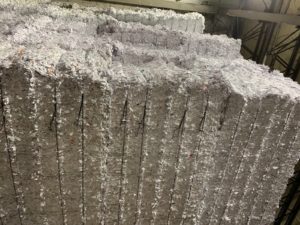You know better than to toss sensitive documents in the trash. So I’m guessing you have some sort of setup for recycling paper in your business, and probably in your home too. Anything that’s printed with private information either gets shredded right away, or put in a container for shredding later. Keeping the information on that paper private is your responsibility—until the paper is sent to be shredded and recycled.
When choosing a vendor, there are a few questions you should ask. Where does all that shredded paper go? How
does it get transformed? And how can you know for sure that your documents are not only permanently destroyed but properly recycled? (Here are a few more questions for a potential data destruction company).
Shredding and Recycling Documents Securely
Considering the damage a single data breach can do to a business, you can’t afford to be lax about data destruction. At least when sensitive documents are in your possession, you know that your procedures and your trusted staff are keeping all that data secure. Your control ends once documents are sent off for shredding and recycling.
If you’re worried that your data might still be vulnerable after your paper has been shredded, let me assure you that it’s not. Some home shredders may create shreds that can still be read and reassembled by someone truly motivated, but the industrial shredders that we use create cross-cut shreds too small to be read. Huge quantities of shredded paper are mixed together in one container.
Plus, once shredded material is in our possession, it’s kept behind locked doors until it’s recycled—but again, it’s no longer of any use to data thieves at this point. Still, if you have specific concerns about how your sensitive documents are handled by your shredding and recycling vendor, you should feel free to ask. A reputable company will have no problem explaining its security procedures to clients.
How Recyclers Handle Shredded Paper
Every shredding and recycling vendor operates in its own way. Generally, once a container of shredded paper is full, the recycler will compress the paper into bales for easy transportation. Most recyclers don’t have the capacity to actually transform shredded paper into new products, so we send our shreds to a paper recycling plant.
At the plant, paper is sorted by grade into different categories (cardboard, newspaper, etc.). It’s mixed with water and chemicals, which break down the paper into fibrous pulp. This pulp is treated to remove any ink and may also be bleached. The wet, whitened pulp is forced through screens to remove any non-paper debris. It’s formed into sheets and dried using rollers, creating new paper.
Shredded and recycled paper may be transformed into any number of new things. Generally, shredded office paper is turned into new office paper, or made into paper products such as napkins, paper towels and toilet paper.
Arranging for Shredding and Recycling
Trusting a shredding and recycling company to handle your sensitive documents certainly makes it easy to securely dispose of these papers. You collect them in locked bins, then we come in and take care of everything else. We are AAA certified by NAID, so you can feel confident that your discarded documents are being handled securely. If your organization handles its own shredding onsite, your shredding and recycling vendor can also pick up your shredded paper so it can be properly recycled.
Note that procedures are different for individual consumers than for businesses that need commercial recycling support. Shredded paper generated by individuals at home generally won’t end up being recycled into new paper. Unfortunately, municipalities are often unable to accept shredded paper for recycling because the tiny pieces get everywhere and contaminate other recyclables. If you have a desk-side shredder at home, check with your local recycling program to inquire about potential drop-off locations for this waste. Otherwise, those shreds may have to go in the trash and ultimately end up in a landfill.
So that’s the process of recycling shredded paper. It’s just one of the materials that we handle every day at Northeast Data Destruction and our sister company Miller Recycling. I’m always happy to talk about how our recycling procedures support the environment and our clients’ needs.
What other questions do you have about shredding and recycling? We’re here to answer them at Northeast Data Destruction. Contact us today.
